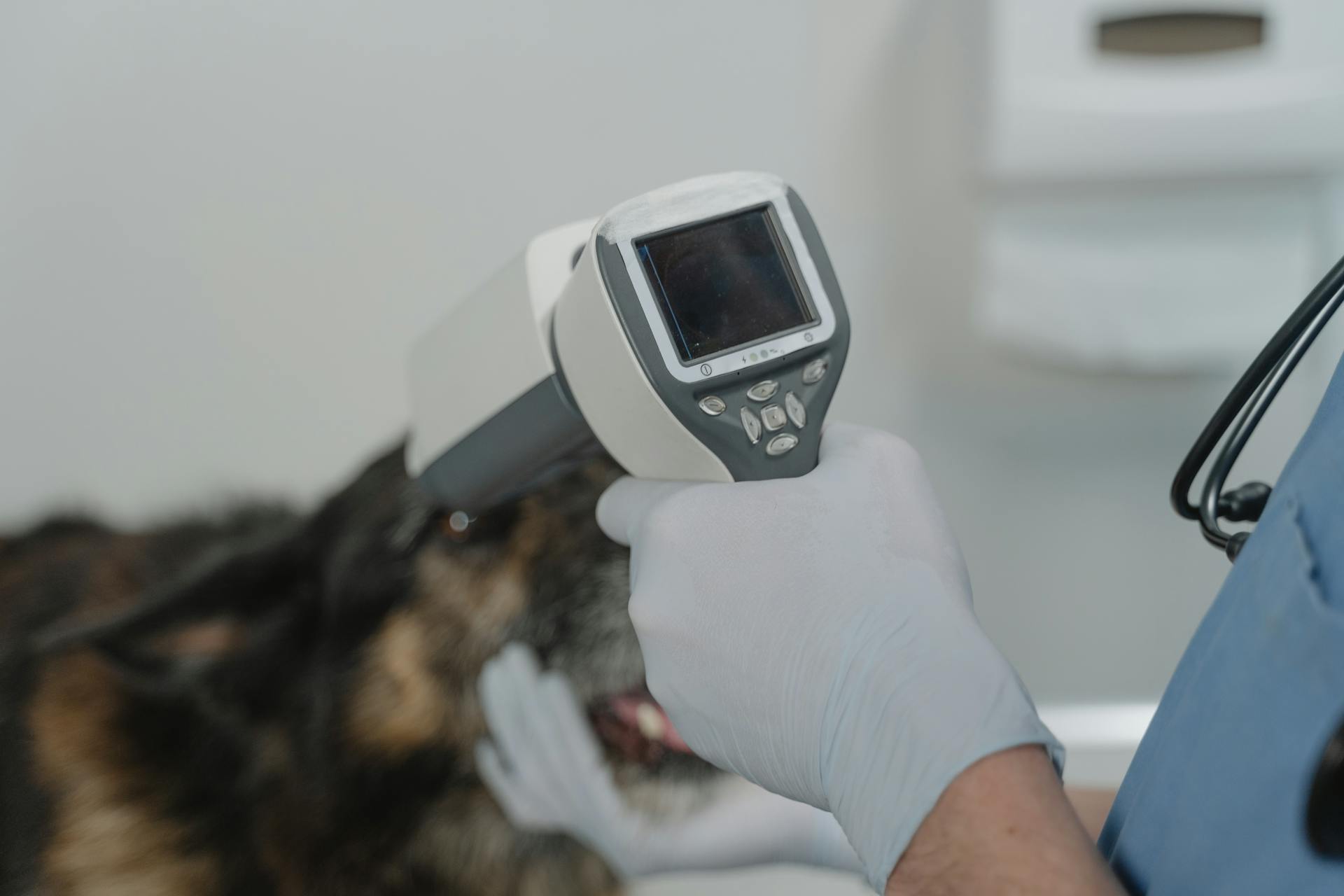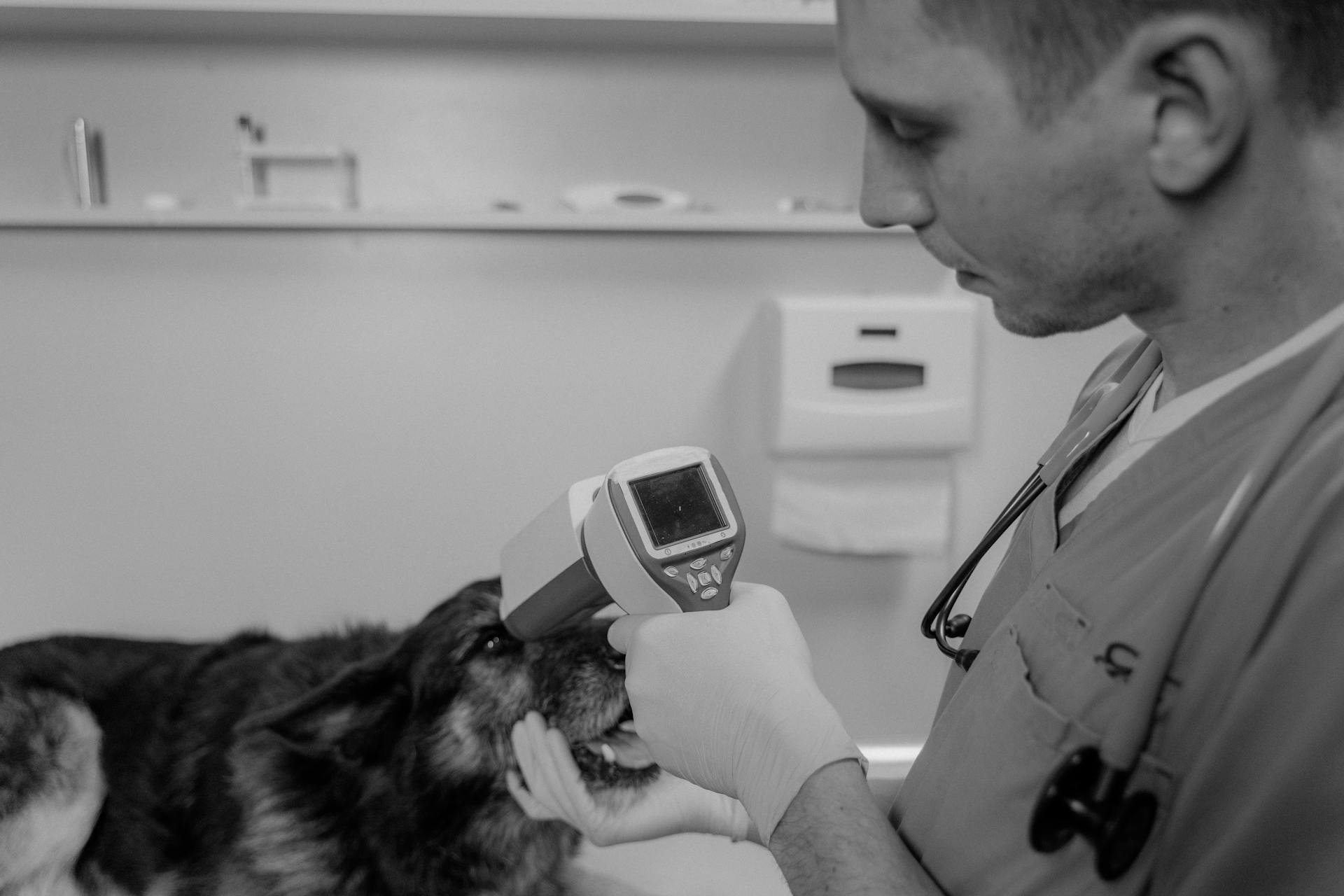
Canine Cancer Awareness Month is a crucial reminder of the importance of recognizing the signs and causes of cancer in our furry friends. According to the American Kennel Club, cancer is the leading cause of death in dogs over the age of 10.
Many types of cancer can affect dogs, including lymphoma, melanoma, and osteosarcoma. Lymphoma, in particular, is a common form of cancer that affects a dog's immune system.
Some common signs of cancer in dogs include weight loss, lethargy, and changes in appetite. These symptoms can be subtle, making it essential for dog owners to be aware of their pet's behavior and physical condition.
Regular check-ups with a veterinarian can help identify potential health issues early on, potentially saving a dog's life.
Worth a look: Canine Epitheliotropic Lymphoma
Canine Cancer Awareness
Canine Cancer Awareness is a vital part of raising awareness and funds for research. The Morris Animal Foundation is a leading entity in funding studies for advancements in animal health, including cancer.
You might enjoy: National Canine Lymphoma Awareness Day
The National Canine Cancer Foundation and the Puppy Up Foundation both work to fund research and increase awareness about cancer in dogs. They play a crucial role in advancing the understanding and treatment of cancer in pets.
The Animal Cancer Foundation specializes in comparative oncology, researching cancers that affect both pets and humans, to improve treatments across species. This groundbreaking research has the potential to benefit both humans and animals.
On a similar theme: Can Dogs Catch Strep from Humans
Types of Canine Cancer
Canine cancer can be a complex and varied condition, with over 30 kinds of lymphoma affecting dogs.
Lymphoma can affect a dog's lymph nodes, bone marrow, and liver, and is often triggered by other medical issues.
Some forms of cancer are more common than others, and some cancers are more aggressive than others.
Here are a few types of canine cancer you should be aware of:
- Prostate Cancer In Dogs
- Bone Cancer In Dogs
- Liver Cancer In Dogs
- Basal Cell Carcinoma In Dogs
These types of cancer can be caused by environmental factors, such as exposure to sunlight, chemicals, and certain medical conditions.
What Are the Signs?
If you notice your furry friend is experiencing a change in appetite, it could be a sign of something serious.
Wounds that don't heal quickly or seem to be getting worse are another red flag.
Weight loss, even if your dog is eating normally, can be a sign of cancer.
Coughing or difficulty breathing are symptoms that shouldn't be ignored.
Swelling in various parts of the body can be a sign of cancer, so it's essential to keep an eye out.
Pain is a common symptom of many types of cancer in dogs.
Bad breath or a strange odor can be a sign of dental issues or other health problems.
Abdominal swelling can be a sign of cancer, so it's crucial to monitor your dog's midsection.
Changes in bathroom habits, such as urinating more frequently, can be a sign of a urinary tract infection or other health issues.
Lethargy or depression in dogs can be a sign of a range of health problems, including cancer.
Readers also liked: Why Do Yorkshire Terriers Lick so Much
Vaginal discharge is a symptom that should always be checked out by a veterinarian.
Difficulty eating or swallowing can be a sign of oral or esophageal cancer.
Lameness or stiffness in your dog's legs can be a sign of bone cancer or other musculoskeletal issues.
Foul odor from your dog's mouth, skin, or other areas can be a sign of infection or other health problems.
Bleeding or discharge from any area of your dog's body should always be taken seriously.
Here is a list of common signs of cancer in dogs:
- Change in appetite
- Wound
- Weight loss
- Coughing or difficulty breathing
- Swelling
- Pain
- Bad Breath (Strange odor)
- Abdominal Swelling
- Changes in bathroom habits
- Lethargy or depression
- Vaginal discharge
- Difficulty eating
- Lameness
- Foul odor
- Bleeding or discharge
- Lethargy
- Exercise intolerance
- Vomiting
- Difficulty urinating
- Cough
- Straining to urinate or defecate
- Decreased energy levels
- Drinking more or less water
Lymphoma
Lymphoma is a type of cancer that affects a specific type of white blood cell called a lymphocyte, as well as other lymphoid tissues.
There are over 30 kinds of canine lymphoma, which can affect any breed or age, but it's most common in middle-aged to older pets, with golden retrievers being at higher risk.
Lymphoma can manifest differently and there are many different types, most often resulting in the enlargement of one or more lymph nodes.
Suggestion: Canine Lymphoma Progression
Symptoms can include enlarged lymph nodes, lethargy, decreased appetite, and weight loss.
Diagnosis can often be obtained by biopsy, and further testing called staging can help to better understand the nature and degree of disease.
Chemotherapy is often part of the treatment plan for a pet diagnosed with lymphoma, and in one study, about 70 percent of cats went into remission after chemo.
Here are some common symptoms of canine lymphoma:
- Enlarged lymph nodes (with or without other symptoms)
- Lethargy
- Decreased appetite
- Weight loss
Squamous Cell Carcinoma (SCC)
Squamous Cell Carcinoma (SCC) is a type of cancer that affects the mouth of dogs.
Early warning signs of SCC include drooling, bleeding, and trouble eating.
Surgery is often recommended as a treatment option for SCC, but it can be tricky with smaller dogs due to the small size of their mouths.
Radiation and chemotherapy are also possible treatments for SCC.
Mast Cell Tumor
Mast Cell Tumor is a common cancer in dogs, often forming on or near the surface of their skin.
Tumors can also be found around a dog's eyes, mouth, throat, and spine.
Early detection is crucial, as the location and size of the tumor will determine whether it's operable.
The difference between operable and non-operable tumors can be a matter of life and death.
Mammary Tumors
Mammary Tumors are a common type of cancer in female dogs, representing between 50 and 70 percent of neoplasias in unfixed females.
Mammary tumors are also fairly common in cats, although 90 percent of them are malignant.
Surgery is often recommended for pets with mammary tumors, and some may benefit from radiation or chemo afterward.
Discover more: Mammary Tumor in Dog
Osteosarcoma
Osteosarcoma is a common kind of cancer in dogs, also known as bone cancer. It's very painful and can affect any dog, but some breeds are at higher risk.
Certain dog breeds, such as Dobermans, boxers, golden retrievers, German shepherds, Irish wolfhounds, rottweilers, and Weimaraners, are more likely to develop osteosarcoma.
Osteosarcoma is the most common bone cancer in dogs, and researchers are working to identify new treatments for it, such as Dr. Heather Gardner and her team, who were funded by Morris Animal Foundation.
This type of cancer can be very painful for dogs, and it's essential to be aware of the breeds that are at higher risk, so you can take steps to prevent or detect it early.
Here are some dog breeds that are more likely to develop osteosarcoma:
- Dobermans
- Boxers
- Golden Retrievers
- German Shepherds
- Irish Wolfhounds
- Rottweilers
- Weimaraners
Treatment and Prognosis
Receiving a cancer diagnosis for your pet can be frightening, but there have been remarkable advances in cancer treatments over the past few years.
Many pets do respond very well to treatments, but every pet is different, so the possible treatments will vary depending on the exact diagnosis.
Your vet will be able to go over specifics with you once they have fully evaluated your pet and gotten results from any recommended tests or screenings.
Cancer is not easily curable, but with new trials always ongoing, there is hope for a positive outcome.
Readers also liked: Preventative Care Keeping Your Pet Healthy Year-Round
Frequently Asked Questions
What is dog cancer called?
Dogs can develop various types of cancer, including skin cancers like melanomas and mast cell tumors, as well as lymphomas and bone cancers
Sources
- https://www.vosrc.net/blog/national-canine-lymphoma-awareness-day/
- https://bluebuffalo.com/why-choose-blue/giving-back/pet-cancer-awareness/
- https://pet-insight.com/akc-canine-health-foundation-marks-canine-cancer-awareness-month-with-3-6-million-invested-in-active-cancer-research/
- https://dogtime.com/dog-health/canine-cancer/64061-may-pet-cancer-awareness-month-heres-know
- https://twinpinesvet.com/cancer-awareness-month/
Featured Images: pexels.com


